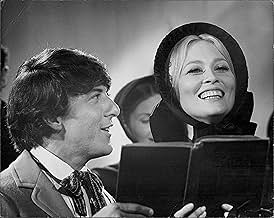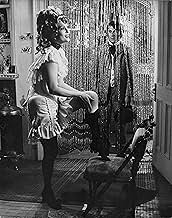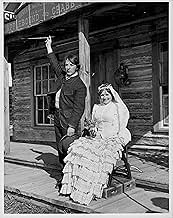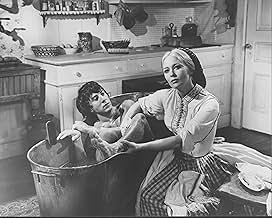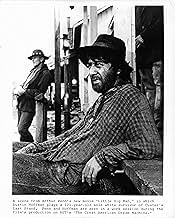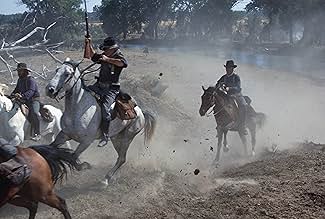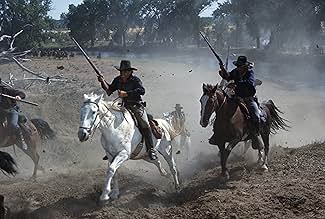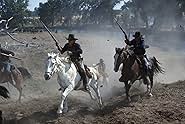Jack Crabb blickt im hohen Alter auf sein Leben zurück und erzählt, wie er bei den Ureinwohnern Amerikas aufwuchs und mit General Custer kämpfte.Jack Crabb blickt im hohen Alter auf sein Leben zurück und erzählt, wie er bei den Ureinwohnern Amerikas aufwuchs und mit General Custer kämpfte.Jack Crabb blickt im hohen Alter auf sein Leben zurück und erzählt, wie er bei den Ureinwohnern Amerikas aufwuchs und mit General Custer kämpfte.
- Regie
- Drehbuch
- Hauptbesetzung
- Für 1 Oscar nominiert
- 5 Gewinne & 11 Nominierungen insgesamt
- Sunshine
- (as Amy Eccles)
- Caroline
- (as Carol Androsky)
- Lieutenant
- (as Jess Vint)
Empfohlene Bewertungen
Well, this was destined to be a headliner--Arthur Penn directing (after "Bonnie and Clyde") and Dustin Hoffman (after "The Graduate" and "Midnight Cowboy"). And it's a comedy in the wackiest way. Hoffman is a survivor from Little Big Horn (Custer's Last Stand) and this is an invented life up to that point, told from memory to man with a tape recorder at the age of 123.
And the old (old!) Hoffman is pretty terrific, mostly in the narration, but including some pretty caked on make-up, too. Most of the movie is a young Hoffman as both Indian and White Man (alternating, depending on how he gets miraculously saved from one disaster after another). It's a farce, yes, but there are overtones of tragedy throughout (the annihilation of a race can only be so funny for so long) and there are some truly violent scenes, mostly of Indians being slaughtered by the Army.
It might help to know this is a metaphor of sorts about the brutality of the Army in Vietnam, which was raging at the time. It does make it all less frivolous. But it's also just fine as a crazy retelling of the last great famous Indian War, and the events (more or less) leading up to it. Hoffman is terrific in his usual way, and the support around him funny, especially the old Indian Chief, played by Chief Dan George. The two other big stars appear only briefly, Faye Dunaway in a couple scenes, and Martin Balsam in one. It's really Hoffman's film, and Penn's, too, with a grand and complex range of scenes inside and out, night and day, city and wide open country.
It didn't strike me as a brilliant film, or even as funny as it could have been, but it's endlessly engaging and there are some witty and funny moments sprinkled all through. It is long, and I might not call it slow even though it feels like it drags here and there, for sure.
Poor Hoffman just can't find himself a niche in the world of the west either with white men or with Indians. He finds himself in the Dakota Territory of the 1870s and makes the acquaintance of such people as Wild Bill Hickok and George Armstrong Custer, a couple of old west legends who met famous premature deaths in the same year of 1876. And of course some lesser people in mostly low places.
Hoffman gets some great support from people like Martin Balsam as a medicine show conman whom he spends some time with and Faye Dunaway as the widow woman who takes the orphan Hoffman in and explains and demonstrates the facts of life. Jeff Corey plays Wild Bill Hickok who explains to Hoffman he really doesn't have the right stuff to be a gunfighter.
Best of all is Richard Mulligan as the controversial General George Armstrong Custer whose ambitions for military glory led to the massacre at Little Big Horn. Mulligan is ambitious and will not take good advice. Watching Little Big Man in the scenes with Mulligan it was like looking at Donald Trump campaigning for president. Just like The Donald, Mulligan will not listen to anyone other than himself. In fact you mostly have to use reverse psychology to get Mulligan to do things your way. Hoffman may be a misfit, not unlike his character in The Graduate, but he learns to play Mulligan like a piccolo.
Little Big Man is a different and entertaining look at the old west and Hoffman is superb. But the one to really watch in this is Richard Mulligan. He steals the film in whatever scene he's in.
This is the story of Jack Crabb who begins the movie as a 121 year old man in a nursing home recounting his life.And what a life it was.He bounces back and forth in the Old west between the world of the white man and the world of the Native American.Crabb sees and does just about everything possible in both worlds.The joy and sadness and fun he has along the way makes for one helluva movie.
Dustin Hoffman is brilliant in this film.It may be his best performance ever yet it is somehow overlooked when many people think of his movies.It is a tour de force for Hoffman who plays an Indian and gunslinger and drunkard and muleskinner and many other things in this movie. Chief Dan George is nothing short of amazing in this movie.But yet one critic said he wasn't acting,he was just an Indian playing an Indian.Bah! Richard Mulligan was so perfect as General George Custer in this movie that he is who I see whenever I hear the name of Custer mentioned.Faye Dunaway and Martin Balsam create memorable characters too.
This movie makes one of the strongest statements I've ever seen about the treatment of the Native Americans yet you probably won't even realize it at the time.This is a movie that you'll replay in your head and then it hits you that there was even more there than met the eye.
The humor,tragedy and lush characters will stay with you long after you see this movie.This movie is based on the fine book by Thomas Berger and is very faithful to it.I recommend the book wholeheartedly, too.
Critique: Extremely enjoyable, epic western directed by Arthur Penn. Praised for its depiction of Native Americans, it has biting satirical (and political) touches, saddled with farcical historical accounts of the Indian Wars. The once controversial aspects were meant to represent the ideologies of the time, but it has not lost any of its grit.
What I like the most is its unique interpretation of Indians. Never in the long cycles of American westerns were Indians presented as almost alien, coming across as a mythical people whose ignorance of political maneuvers and technology proved their downfall. A very bitter and sad farewell swansong to what war and genocide has taken away.
Atypical cast delivers strong passages but you won't forget the 2-standout roles of General Custer as portrayed by the maniacal Richard Mulligan and 'Old Lodge Skies' played by the philosophical Chief Dan George.
QUOTES: Old Lodge Skies: "There is an endless supply of white men. But there has always been a limited number of 'human beings'. We won today, we won't win tomorrow."
It's an epic, tragic tale - but one told with an often very funny voice. Part satire, part honest look at America's dark and untold history, the tone and narrative structure of this film were ground-breaking. And it still looks fresh: the script, the acting, the camera, the music: everything still oozes quality more than 40 years later. A timeless classic. 9 stars out of 10.
Favorite Films: http://www.imdb.com/list/ls054200841/
Lesser-known Masterpieces: http://www.imdb.com/list/ls070242495/
Favorite Low-Budget and B-movies: http://www.imdb.com/list/ls054808375/
Favorite TV-Shows reviewed: http://www.imdb.com/list/ls075552387/
Wusstest du schon
- WissenswertesThe role of Old Lodge Skins was initially offered to Marlon Brando, who turned it down. Other sources claim Arthur Penn's first choice for the role was Sir Laurence Olivier. When that didn't work out, Richard Boone was slated for the role. When Boone backed out at the last minute, Chief Dan George was given the part and earned an Oscar nomination.
- PatzerThe wires forcing a horse to fall are visible in the final battle scene, just before Custer exclaims "Fools! They're shooting their own horses!"
- Zitate
Jack Crabb: Do you hate them? Do you hate the White man now?
Old Lodge Skins: Do you see this fine thing? Do you admire the humanity of it? Because the human beings, my son, they believe everything is alive. Not only man and animals. But also water, earth, stone. And also the things from them... like that hair. The man from whom this hair came, he's bald on the other side, because I now own his scalp! That is the way things are. But the white man, they believe EVERYTHING is dead. Stone, earth, animals. And people! Even their own people! If things keep trying to live, white man will rub them out. That is the difference.
- VerbindungenFeatured in Regie: Arthur Penn (1970)
- SoundtracksBringing In the Sheaves
(1880) (uncredited)
Music by George A. Minor (1880)
Hymn by Knowles Shaw (1874)
Sung a cappella by Faye Dunaway
Top-Auswahl
- How long is Little Big Man?Powered by Alexa
Details
Box Office
- Budget
- 7.000.000 $ (geschätzt)
- Bruttoertrag in den USA und Kanada
- 31.559.552 $
- Weltweiter Bruttoertrag
- 31.559.552 $

